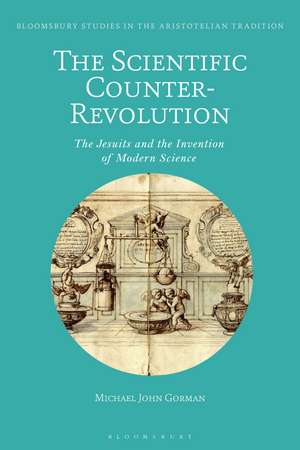The Scientific Counter-Revolution: The Jesuits and the Invention of Modern Science: Bloomsbury Studies in the Aristotelian Tradition
Autor Dr Michael John Gormanen Limba Engleză Paperback – 23 mar 2022
| Toate formatele și edițiile | Preț | Express |
|---|---|---|
| Paperback (1) | 199.10 lei 6-8 săpt. | |
| Bloomsbury Publishing – 23 mar 2022 | 199.10 lei 6-8 săpt. | |
| Hardback (1) | 599.50 lei 6-8 săpt. | |
| Bloomsbury Publishing – 16 sep 2020 | 599.50 lei 6-8 săpt. |
Din seria Bloomsbury Studies in the Aristotelian Tradition
- 20%
 Preț: 219.57 lei
Preț: 219.57 lei -
 Preț: 193.36 lei
Preț: 193.36 lei - 23%
 Preț: 191.22 lei
Preț: 191.22 lei - 23%
 Preț: 191.31 lei
Preț: 191.31 lei - 14%
 Preț: 512.22 lei
Preț: 512.22 lei - 30%
 Preț: 511.48 lei
Preț: 511.48 lei - 22%
 Preț: 236.45 lei
Preț: 236.45 lei - 22%
 Preț: 239.85 lei
Preț: 239.85 lei - 22%
 Preț: 230.51 lei
Preț: 230.51 lei - 13%
 Preț: 222.55 lei
Preț: 222.55 lei - 21%
 Preț: 216.99 lei
Preț: 216.99 lei - 23%
 Preț: 198.12 lei
Preț: 198.12 lei - 23%
 Preț: 198.57 lei
Preț: 198.57 lei - 30%
 Preț: 510.42 lei
Preț: 510.42 lei - 30%
 Preț: 510.49 lei
Preț: 510.49 lei - 30%
 Preț: 511.14 lei
Preț: 511.14 lei - 30%
 Preț: 511.48 lei
Preț: 511.48 lei -
 Preț: 250.59 lei
Preț: 250.59 lei
Preț: 199.10 lei
Preț vechi: 258.58 lei
-23% Nou
Puncte Express: 299
Preț estimativ în valută:
38.10€ • 39.78$ • 31.46£
38.10€ • 39.78$ • 31.46£
Carte tipărită la comandă
Livrare economică 15-29 aprilie
Preluare comenzi: 021 569.72.76
Specificații
ISBN-13: 9781350211438
ISBN-10: 1350211435
Pagini: 296
Dimensiuni: 156 x 234 mm
Greutate: 0.41 kg
Editura: Bloomsbury Publishing
Colecția Bloomsbury Academic
Seria Bloomsbury Studies in the Aristotelian Tradition
Locul publicării:London, United Kingdom
ISBN-10: 1350211435
Pagini: 296
Dimensiuni: 156 x 234 mm
Greutate: 0.41 kg
Editura: Bloomsbury Publishing
Colecția Bloomsbury Academic
Seria Bloomsbury Studies in the Aristotelian Tradition
Locul publicării:London, United Kingdom
Caracteristici
Explores the Jesuits' role in key areas of Aristotelian controversy, including the Galileo Affair and the vacuum debate
Notă biografică
Michael John Gorman is Professor of Life Sciences in Society at Ludwig-Maximilians-University, Munich, Germany and Founding Director of BIOTOPIA Naturkundemuseum Bayern, Germany.
Cuprins
Introduction 1. Establishing Mathematical Authority and the Politics of Christoph Clavius 2. Trusting the Jesuit Mathematicus 3. Grienberger, Mathematics and Modesty in the Collegio Romano 4. The Uses of Correspondence 5. Magnetic Declination and the Problem of Longitude 6. Discipline and Authority 7. Experiment, Expertise and Centralized Authority 8. Theatricality and the Failure of Replication Appendix: Documenting Public Mathematics in the Collegio Romano Bibliography Index
Recenzii
This is a finely researched and richly documented book ... The Scientific Counter-Revolution is a highly valuable additionto the recent corpus of literature that has served the abandonment of "a conflictual approach to the relationship between early modern science and Catholicism" without replacing conflict "with an equally inappropriate image of harmony".
The book offers a rich and extensively documented portrait of the scientific community centred on the Collegio Romano, with an impressive number of both printed and manuscript sources cited in the notes.
Gorman invites us to witness the transformations in scientific knowledge and practice from the vantage point of the Roman College. This deeply researched study explores how and why Christopher Clavius became the model Jesuit mathematician, and what successive generations did with this legacy. The result is a rich, multi-dimensional portrait of Jesuit science and its contributions to major scientific controversies of the seventeenth century that resists oversimplification.
Using a remarkable range of printed and manuscript sources, this perceptive book traces significant Jesuit scholars and mathematicians to illuminate the experimentation, correspondence and long-range organisational authority that helped to provide some of the most important resources for new knowledge in early modern Europe. Gorman's impressive analysis also speaks to wider debates on the relationship between social organisations, faith and authority.
The book offers a rich and extensively documented portrait of the scientific community centred on the Collegio Romano, with an impressive number of both printed and manuscript sources cited in the notes.
Gorman invites us to witness the transformations in scientific knowledge and practice from the vantage point of the Roman College. This deeply researched study explores how and why Christopher Clavius became the model Jesuit mathematician, and what successive generations did with this legacy. The result is a rich, multi-dimensional portrait of Jesuit science and its contributions to major scientific controversies of the seventeenth century that resists oversimplification.
Using a remarkable range of printed and manuscript sources, this perceptive book traces significant Jesuit scholars and mathematicians to illuminate the experimentation, correspondence and long-range organisational authority that helped to provide some of the most important resources for new knowledge in early modern Europe. Gorman's impressive analysis also speaks to wider debates on the relationship between social organisations, faith and authority.
